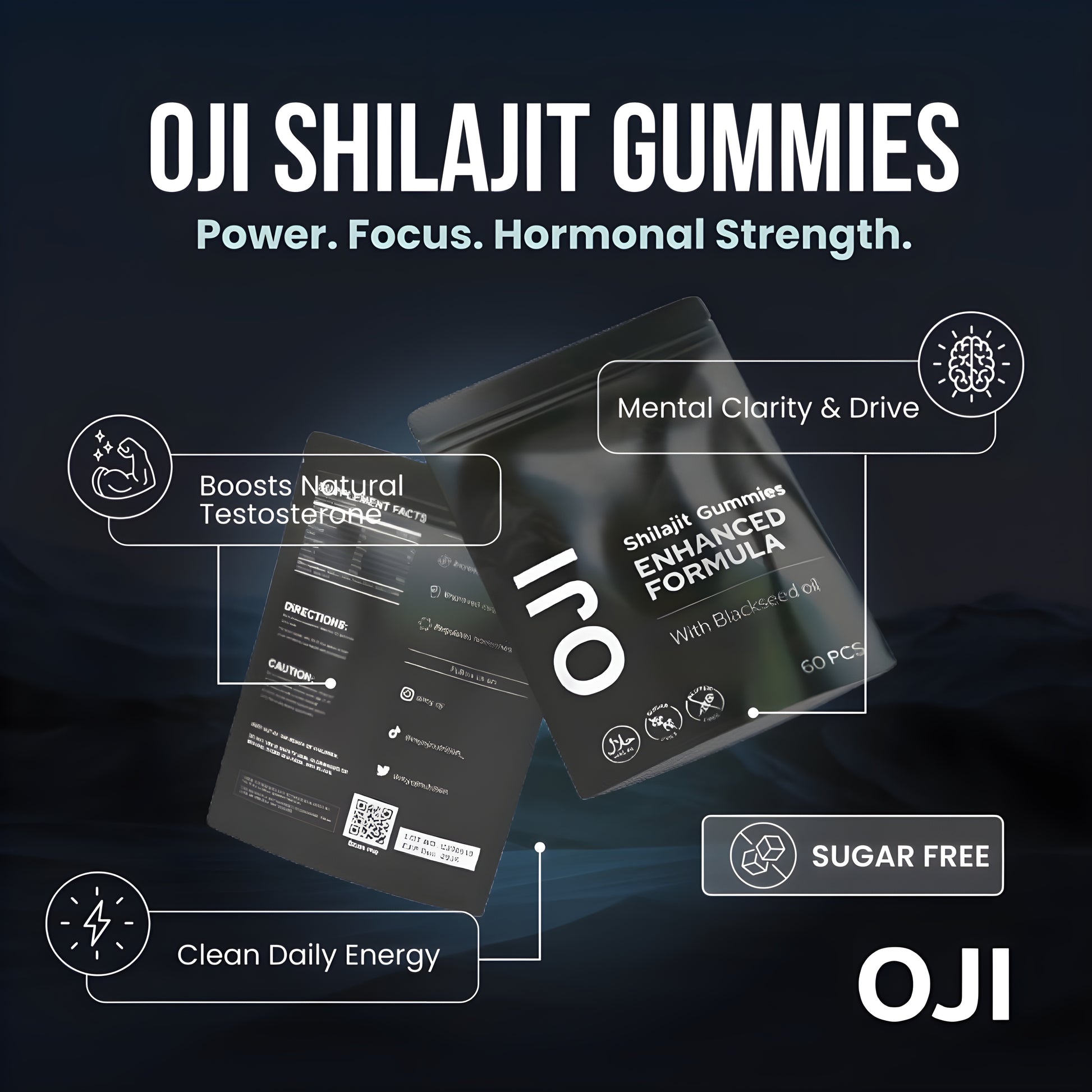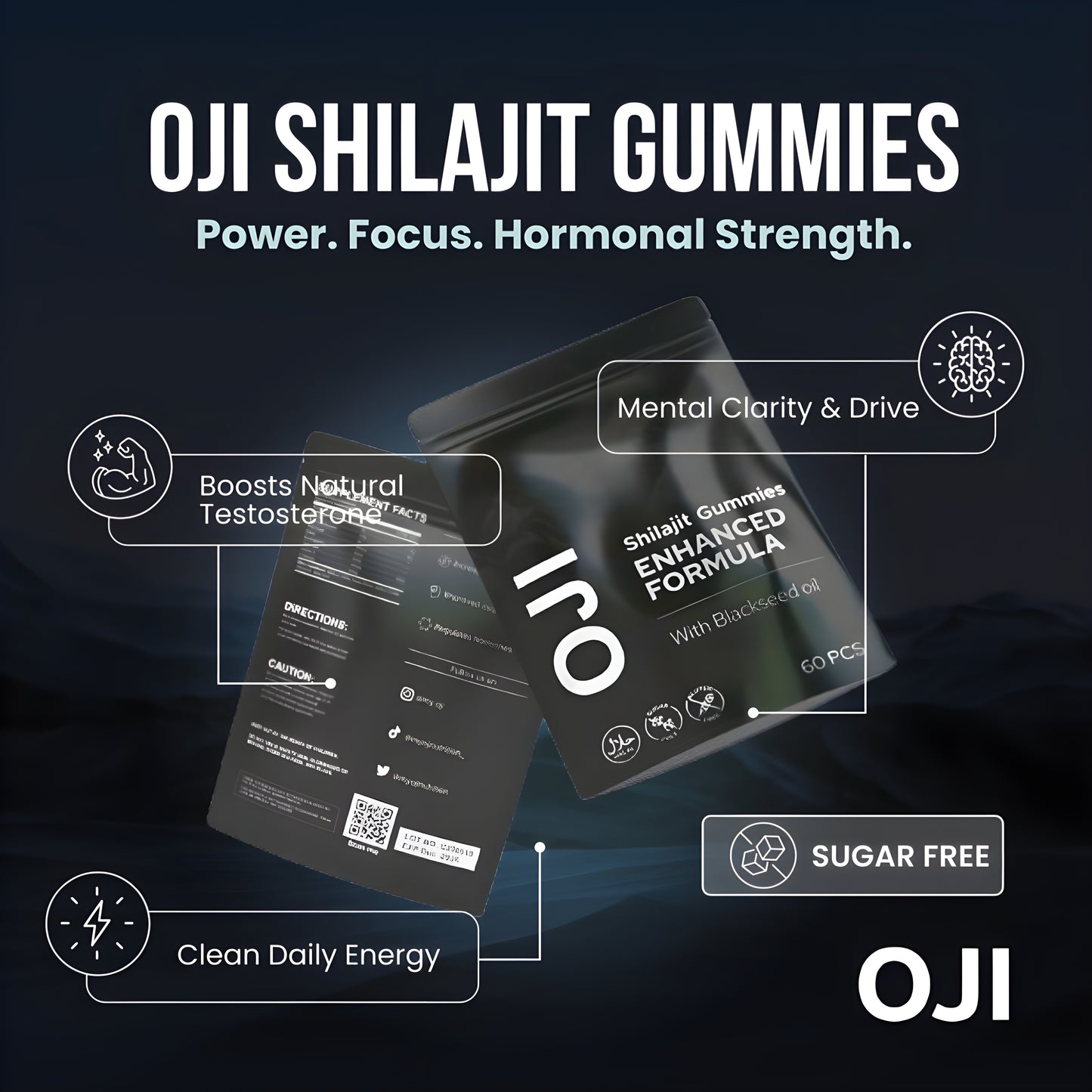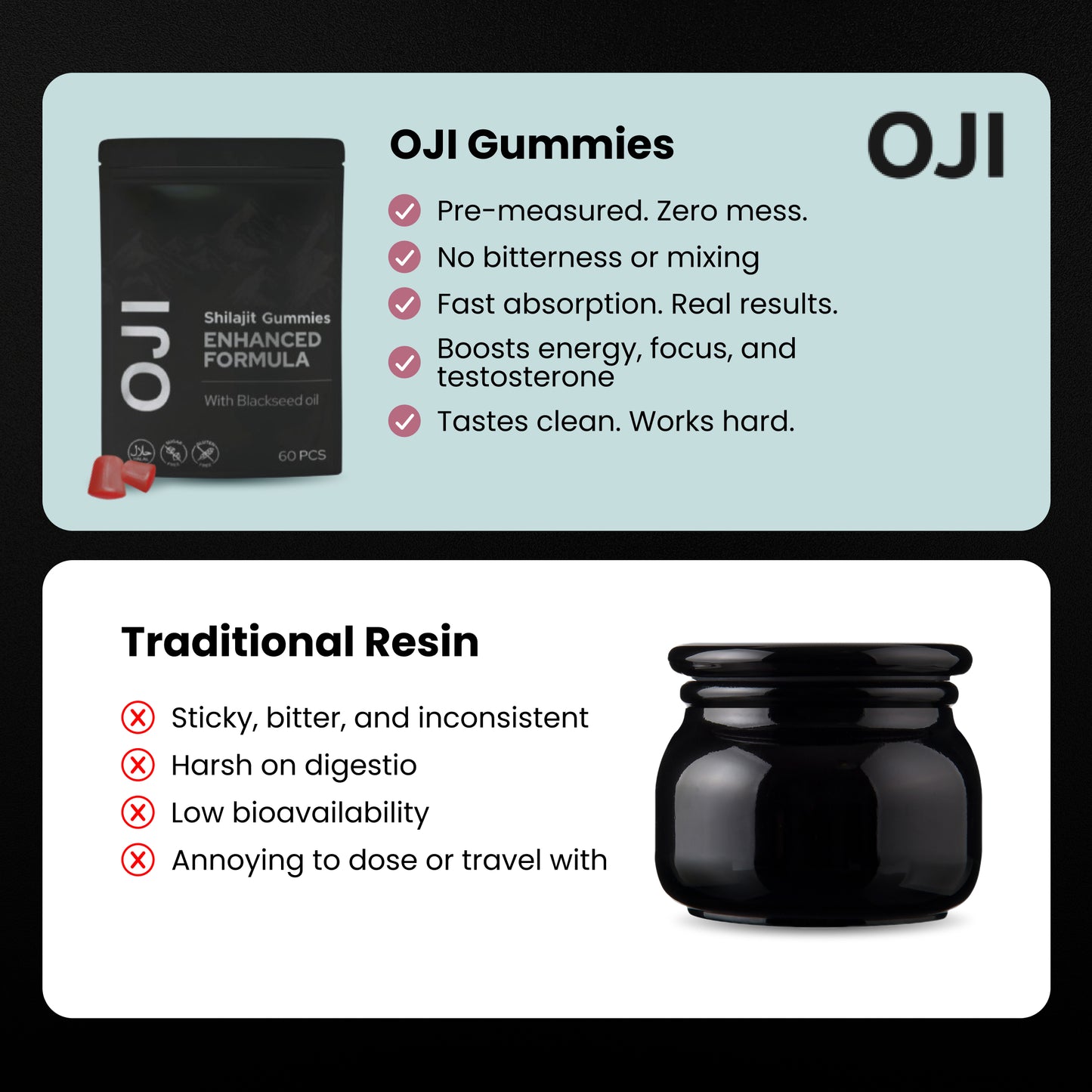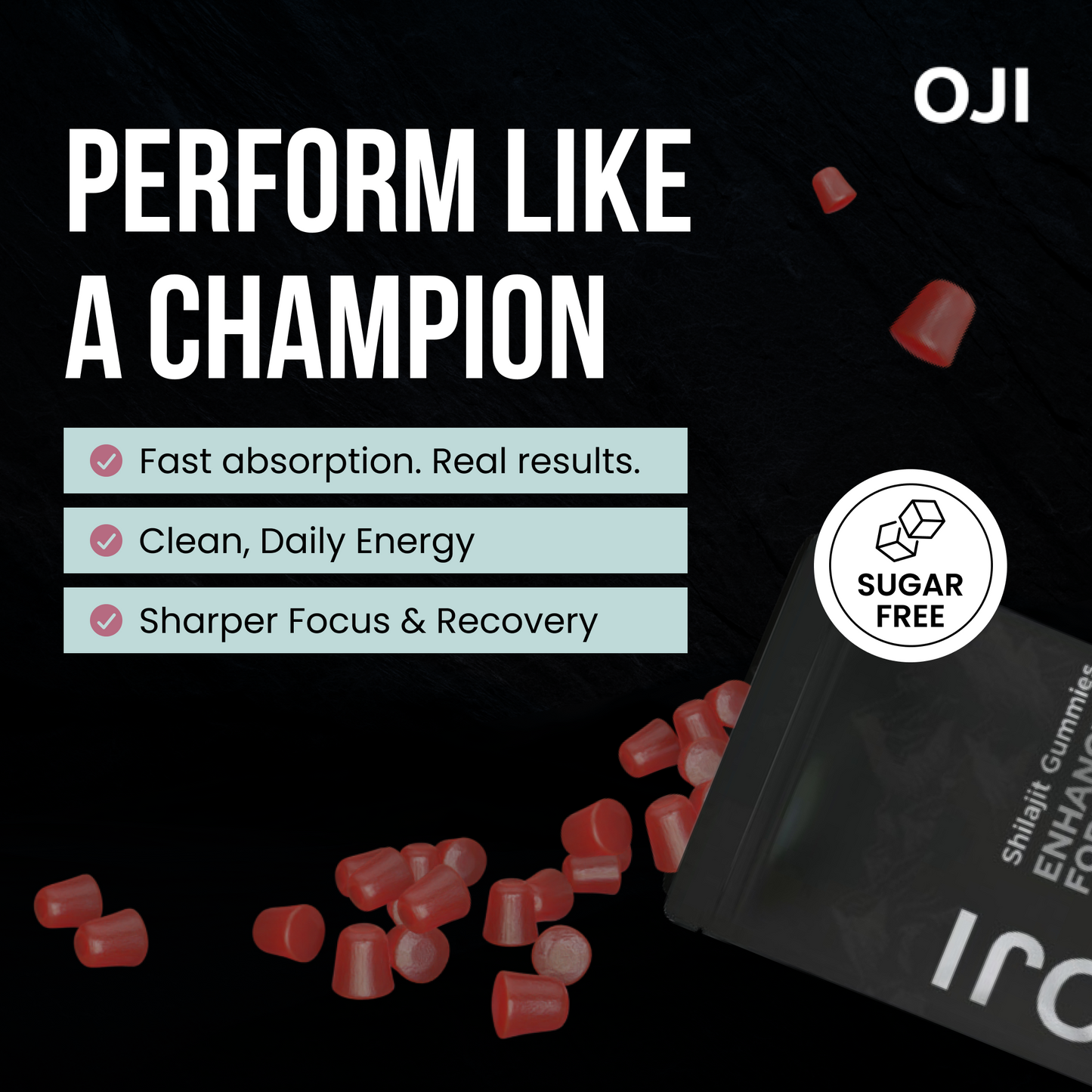Using supplements for hormone balance is a practical way to support your body's natural rhythms, especially when paired with smart lifestyle adjustments. Take action by viewing them as targeted support, providing key nutrients like Vitamin D, magnesium, and adaptogenic herbs to fill nutritional gaps and help your body manage stress more effectively.
Understanding Your Body's Hormonal System
Before diving into specific supplements, it's crucial to understand what you're supporting. Your hormonal system is like a finely tuned orchestra. When each hormone plays in sync, you experience stable energy, clear thinking, and a balanced mood.
If one instrument is out of tune, it disrupts the entire performance. This is a hormonal imbalance. Key hormones like cortisol (stress), testosterone, and oestrogen must work together. When their signals get muddled, you start to feel the effects.
How to Recognise the Signals of Imbalance
Your body sends clear signals when something is amiss. Your first actionable step is to learn to recognise these signs. If you experience persistent, unexplained symptoms, it's your body asking for a tune-up.
Take note of these common signs of imbalance:
- Persistent Fatigue: Feeling drained even after a full night's sleep.
- Unexplained Mood Shifts: Experiencing irritability, anxiety, or low moods without a clear reason.
- Changes in Weight: Struggling to lose weight or gaining it without cause, especially around your middle.
- Poor Sleep Quality: Having trouble falling asleep, staying asleep, or waking up feeling unrested.
Observing these patterns is the most effective way to understand what your body is trying to tell you.
A hormonal imbalance isn't a single event; it’s a dynamic process shaped by your daily choices. Take control by addressing common culprits like chronic stress, a poor diet, and lack of sleep, which create a domino effect that disrupts your entire endocrine system.
Build a Foundation for Lasting Balance
Supplements are a fantastic tool, but they deliver the best results as part of a larger plan. They are not a magic bullet but a strategic support system. To achieve sustainable results, you must tackle the issue from multiple angles. Start by exploring different strategies on how to balance hormones naturally for better health.
This guide provides the knowledge you need for intelligent supplement use, but first, establish these pillars of good health:
- Eat a nutrient-dense diet.
- Manage stress consistently.
- Engage in regular physical activity.
- Prioritise high-quality sleep.
By building on this solid foundation, you can use supplements for hormone balance to provide targeted support exactly where you need it, creating a reliable path to long-term well-being.
Essential Supplements for Hormonal Support
Figuring out which supplements help with hormone balance can feel overwhelming. To cut through the noise, start with the fundamentals – the core nutrients your body needs to produce and manage hormones. Think of them as the bedrock for your entire endocrine system.
This guide will walk you through the most effective, science-backed supplements available. We’ll cover key vitamins and minerals, powerful adaptogenic herbs, and other crucial compounds. The goal is to provide clear, practical information so you can make confident choices for your health.
To understand how this works, picture your hormonal system like a finely tuned orchestra. You need the right signals (the conductor) and well-maintained instruments (the foundational nutrients).
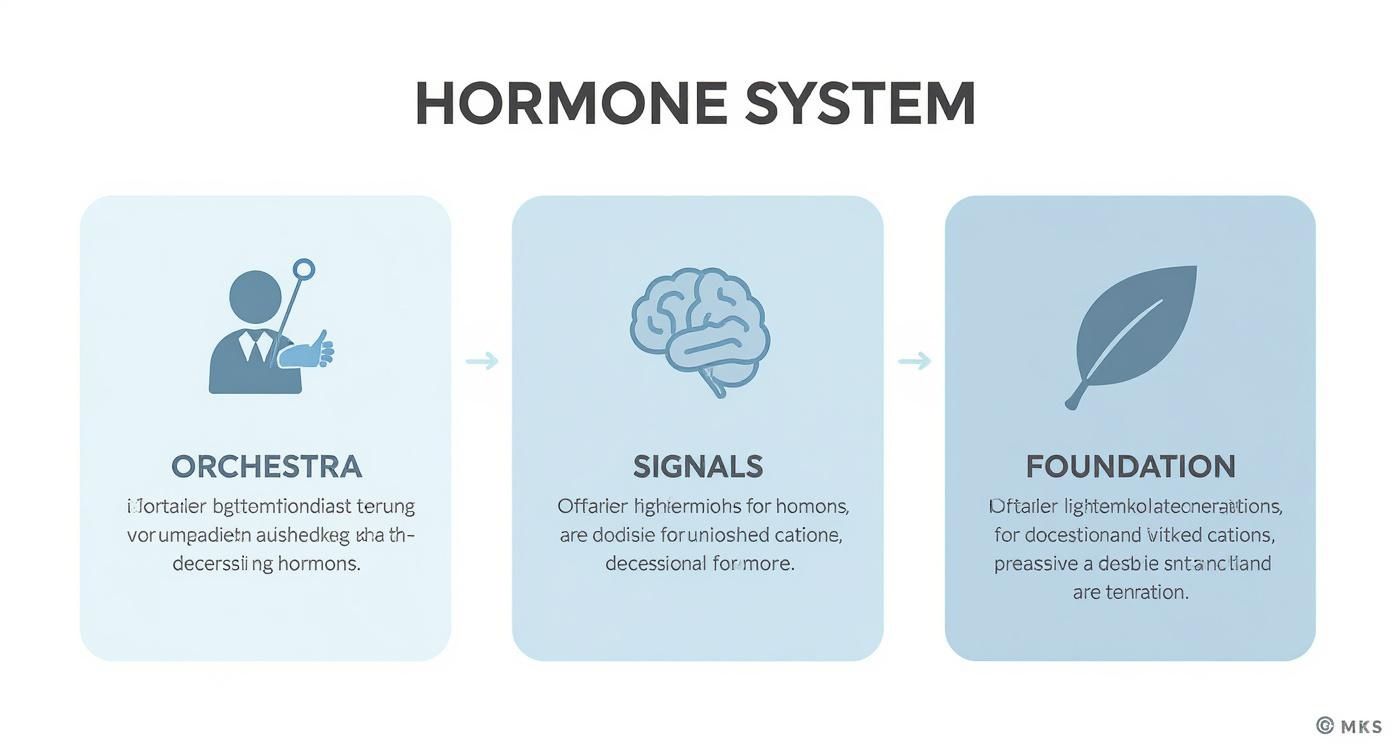
This shows that a healthy hormonal system relies on both high-level signals and the basic nutrients that allow those signals to function correctly.
Foundational Vitamins and Minerals
Before considering specialised herbs, ensure your body has its basic toolkit. Vitamins and minerals are non-negotiable. They are essential co-factors in countless hormonal processes, from production in your adrenal glands to metabolism in your liver. A deficiency in just one can create a bottleneck, disrupting the entire system.
People are catching on. The UK dietary supplements market was valued at around £4.79 billion, with a huge portion dedicated to foundational health. This market is projected to reach an estimated £9.65 billion by 2033, and vitamin supplements already hold the largest share at 37.4%. Getting the basics right is clearly a priority for many.
Here are the key players you should prioritise:
- Vitamin D: Often called the "sunshine vitamin," Vitamin D acts more like a hormone itself. It is crucial for regulating insulin sensitivity and supporting thyroid function. Low levels are directly linked to imbalances in sex hormones, making it a cornerstone of any hormone support plan.
- Magnesium: This mineral is a true workhorse, involved in over 300 bodily reactions, including those that regulate your stress hormone, cortisol. It calms the nervous system, which helps reduce the stress response and prevents cortisol from running rampant.
- Zinc: Essential for testosterone production in men and ovulation in women, zinc also plays a vital role in converting thyroid hormones into their active form. Studies show that even a mild zinc deficiency can disrupt hormone levels and metabolism.
To get a more detailed look at how these nutrients work on your hormonal pathways, check out our guide on the best vitamins for hormone balance.
To help you get started, here's a quick look at some of the top supplements that can provide targeted support for your hormonal health.
Top Supplements for Hormonal Support
| Supplement | Primary Role in Hormone Balance | Found In | Common Dosage Range |
|---|---|---|---|
| Vitamin D | Acts as a pro-hormone, supports insulin sensitivity, thyroid function, and sex hormone regulation. | Sunlight exposure, fatty fish (salmon, mackerel), fortified dairy/plant milks, egg yolks. | 1,000–4,000 IU daily (best to test levels). |
| Magnesium | Regulates the stress response by calming the nervous system and managing cortisol levels. | Leafy greens (spinach, kale), nuts (almonds), seeds, dark chocolate, avocados. | 200–400 mg daily (citrate or glycinate forms are well-absorbed). |
| Zinc | Crucial for testosterone production, ovulation, and the conversion of thyroid hormones. | Oysters, red meat, poultry, beans, nuts, whole grains. | 15–30 mg daily for men; 8–12 mg for women. |
| Ashwagandha | An adaptogen that helps the body manage stress by lowering elevated cortisol levels. | Root extract of the Withania somnifera plant. | 300–600 mg of a standardised extract daily. |
| Omega-3s | Build healthy cell membranes for hormone signalling and reduce inflammation. | Oily fish (salmon, sardines), flaxseeds, chia seeds, walnuts. | 1,000–2,000 mg of combined EPA/DHA daily. |
Use this table as your starting point, but always remember that individual needs vary. The goal is to find what works for your body.
Powerful Adaptogenic Herbs for Stress Resilience
Once your nutritional foundation is solid, you can add adaptogenic herbs for next-level support. Adaptogens are special plants that help your body become more resilient to physical, chemical, and biological stress. Since chronic stress is a primary driver of hormonal chaos, managing it is a game-changer.
Adaptogens don't just block stress; they train your body's stress-response system to be more efficient. Think of them as a personal trainer for your adrenal glands, helping them bounce back faster and perform better under pressure.
Ashwagandha (Withania somnifera) is one of the most well-studied adaptogens. It has been shown to help lower cortisol levels, reduce stress-related symptoms, and support overall endocrine function. By calming the body's main stress pathway, Ashwagandha can indirectly help rebalance other hormones like testosterone and thyroid hormones, which are often suppressed when cortisol is too high.
Other Key Compounds for Hormonal Harmony
Beyond vitamins and adaptogens, other compounds can provide targeted support for hormone signalling and inflammation. These are the finishing touches that complete a comprehensive hormonal health strategy.
One of the most important is Omega-3 Fatty Acids. Your body uses these essential fats, especially the EPA and DHA found in fish oil, to build healthy cell membranes. Every hormonal signal must pass through these membranes to deliver its message, and omega-3s ensure they are fluid and responsive. They also have powerful anti-inflammatory properties, which help calm the low-grade inflammation often associated with hormonal issues.
Getting these nutrients from your diet is always the best first step. However, modern food processing and soil depletion mean even a healthy diet can fall short. For a broader look at your options, explore more about general purpose essential supplements that can help fill potential gaps and support your overall well-being.
Targeted Supplements For Men's Health
For men, maintaining hormonal balance often comes down to a few key actions: supporting healthy testosterone levels, managing stress, and ensuring your body has the necessary raw materials. While a solid diet and regular exercise are non-negotiable, certain supplements can provide targeted, practical support. Use them as strategic allies in your health plan to work on specific pathways involved in hormone production.
Let's break down some actionable strategies for men's hormonal wellness, focusing on ingredients that support testosterone, shield the body from stress, and boost general vitality. Understanding how these supplements work is the first step toward making smart, long-term health choices.
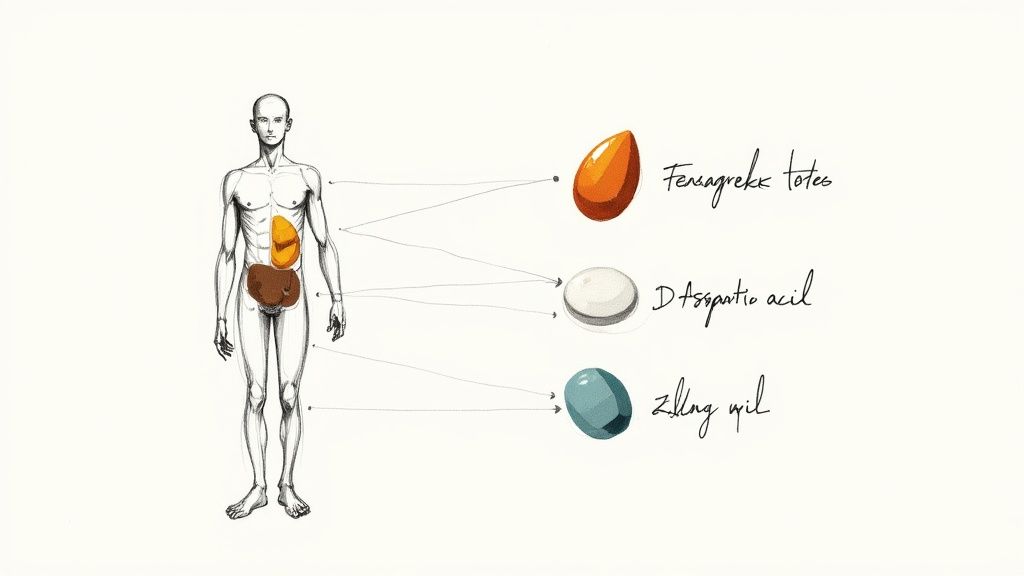
Action Plan for Healthy Testosterone Levels
Testosterone is a cornerstone hormone for men, affecting muscle, energy, mood, and mental sharpness. Levels naturally decline with age, but stress and nutritional gaps can accelerate this process. Fortunately, specific supplements have been well-studied for their ability to support the body’s own testosterone production.
Take action with these well-researched ingredients:
- Fenugreek: This herb contains furostanolic saponins, which are thought to help support testosterone production.
- D-Aspartic Acid (DAA): An amino acid that appears to work in the brain to regulate hormone release, potentially signalling your body to produce more testosterone.
- Zinc: As mentioned, this mineral is essential for hormone production. A deficiency can directly hinder testosterone synthesis, making it a foundational supplement for any man.
To dig deeper, our full guide to testosterone-boosting supplements is a great resource. It offers a more detailed look into the science behind these key ingredients.
How to Manage Cortisol: The Stress Hormone
One of the biggest roadblocks to healthy testosterone is chronic stress. When you're constantly on edge, your body produces the stress hormone, cortisol. Consistently high cortisol can directly interfere with testosterone production. It's often called the "cortisol-testosterone see-saw"—when one goes up, the other usually goes down.
Think of cortisol and testosterone as competing for your body's resources. Your body will always prioritise immediate survival (the stress response) over long-term vitality (like making testosterone). So, managing cortisol isn’t just about feeling less stressed; it's a direct strategy to protect your hormonal health.
This is where you should use adaptogens. These remarkable herbs help your body become more resilient to stress, which in turn helps keep cortisol levels in check. By helping your body adapt, they can prevent cortisol from constantly suppressing your other hormones. It’s a key reason why modern supplements for hormone balance are so focused on stress management.
The Role of Shilajit and Adaptogens
Shilajit is a powerful, unique substance that fits perfectly into this action plan. It’s a sticky, tar-like resin from high-altitude mountain rocks and has been a staple in Ayurvedic traditions for centuries. It’s packed with over 85 trace minerals and a high amount of fulvic acid.
Fulvic acid is a potent antioxidant that helps transport these vital minerals directly into your cells, massively boosting their bioavailability. Modern science is confirming that Shilajit can support energy production at a cellular level and positively affect the endocrine system. For men, some studies suggest it may help support healthy testosterone levels and improve overall stamina.
When you combine the mineral-rich foundation of Shilajit with a proven adaptogen like Ashwagandha, you get a powerful synergy. Shilajit provides the essential building blocks for hormone production, while Ashwagandha helps manage the cortisol that can undermine it. It's an effective, holistic approach that tackles men's hormonal health from both sides—providing essential nutrients while fending off stress.
Navigating Supplements for Women's Health Cycles
A woman's hormonal landscape is always shifting, with needs changing from the monthly menstrual cycle through to perimenopause and beyond. Targeted supplements can offer gentle, practical support during these transitions. The goal isn’t to force a one-size-fits-all solution, but to work with your body's natural rhythms, using specific botanicals to smooth out hormonal peaks and troughs.
This section focuses on evidence-based supplements that can help with the unique challenges women face at different life stages. We'll look at how certain herbs interact with key pathways, like those for oestrogen and progesterone, offering a natural way to support your body. Taking an active role in your own wellbeing is an empowering step.
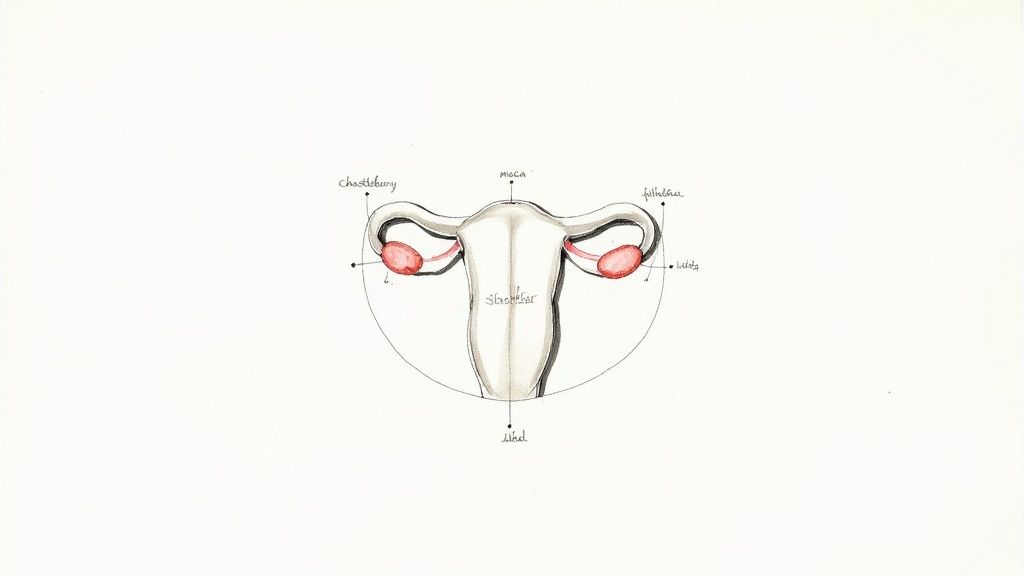
Supporting a Balanced Menstrual Cycle
For many women, the lead-up to menstruation can bring unwelcome PMS symptoms, often tied to natural monthly fluctuations in oestrogen and progesterone. Certain herbal supplements have a long history of use for promoting a more comfortable and regular cycle.
Chasteberry (Vitex agnus-castus) is one of the most well-researched herbs for female hormonal health. It doesn't contain hormones itself. Instead, it acts on the pituitary gland—your body’s hormonal command centre—to help normalise the production of key reproductive hormones. It is particularly known for supporting healthy progesterone levels, which can help ease cycle-related discomfort and mood swings.
Think of Chasteberry as a gentle conductor for your hormonal orchestra. It doesn't play an instrument itself, but it helps ensure the different sections (like progesterone and prolactin) are playing in time and at the right volume, leading to a more harmonious monthly performance.
Enhancing Energy and Libido
During times of hormonal change, it is common for energy levels and libido to decline. This can be due to shifting hormone levels, increased stress, or the general fatigue that comes with a body in flux. Adaptogenic herbs are very useful here, as they help the body build resilience to stress while boosting vitality.
Maca root, a plant from the Andes, has a reputation for supporting energy and libido without directly altering hormone levels. It works as an adaptogen, nourishing the adrenal glands and helping the body cope better with stress. This indirect support can make a real difference to your overall stamina and drive, especially during perimenopause when energy can wane.
Finding Relief During Menopause
Menopause marks a major hormonal shift, primarily driven by a decline in oestrogen. This transition can bring on symptoms like hot flushes, night sweats, and mood changes. It’s no surprise that interest in natural support for this stage of life is growing rapidly.
In the UK, the market for menopause treatments, including dietary supplements, generated around USD 490.1 million. This market segment is the largest and is expected to grow by 4.8% annually between 2025 and 2030. This clearly shows a strong demand for effective, natural solutions. You can dive deeper into these trends by exploring the full menopause market analysis from Grand View Research.
Black Cohosh is a traditional botanical that has been studied extensively for menopausal support. It is thought to work by interacting with serotonin receptors in the brain, which can help regulate body temperature and improve mood. This makes it a popular choice for managing hot flushes and promoting emotional wellbeing.
- Sage is another herb often used to help with excessive sweating and hot flushes linked to menopause.
- Red Clover contains isoflavones, plant-based compounds that can mimic the effects of oestrogen, potentially offering mild relief from deficiency symptoms.
Navigating these life stages requires a thoughtful, individual approach. While these supplements show great promise, hormonal health is complex. Always consult with a healthcare provider to create a safe and tailored plan, ensuring you get the best possible care on your wellness journey.
How to Choose and Use Supplements Safely
You've done the research and are ready to take the next step. But with countless supplements for hormone balance available, choosing the right one can feel like a mission. Let’s cut through the noise and get practical.
Choosing the right product and using it safely is everything. It comes down to knowing what to look for on the label and understanding what certifications mean. This is how you find supplements that are both effective and trustworthy.
You're not alone in your search. The global market for hormonal health supplements is set to hit USD 7.41 billion by 2034, growing at a steady 7.5% each year. Here in the UK, people are more focused than ever on transparency and quality, making it crucial to know what you’re putting in your body. If you’re curious about market trends, you can explore the latest hormonal health supplements market report on futuremarketinsights.com.
Decoding Supplement Labels and Quality Marks
First, learn to read the label like a pro. Don't just glance at the front of the bottle; the real story is on the back.
- Look for Active Ingredients: Check if the supplement contains the specific herb or nutrient you need at an effective dose. Vague phrases like "proprietary blend" can be a red flag, often hiding tiny, ineffective amounts of key ingredients.
- Dodge Unnecessary Fillers: Keep an eye out for binders, artificial colours, and other unneeded additives. A shorter, cleaner ingredients list is usually a good sign.
- Demand Third-Party Testing: Supplements aren't regulated like medicines, so independent checks are your best bet for quality assurance. Look for stamps like GMP (Good Manufacturing Practice), which confirms the product was made in a clean, controlled facility.
Third-party testing proves that what’s on the label is actually in the bottle and free from contaminants. To get the full picture on this crucial quality check, read our guide on the importance of third-party supplement testing.
Practical Steps for Safe Supplement Use
You’ve picked a quality supplement – brilliant. Now, how you use it is just as important. Your body needs time to adjust to anything new, and consistency is key to seeing real changes.
The golden rule is simple: start low and go slow. This lets you see how your body responds before you move to the full dose, reducing the risk of side effects.
Follow this straightforward plan for a safe and effective routine:
- Consult a Professional: Before starting anything new, always talk to your GP or a registered nutritional therapist. They can check for potential interactions with medications and help create a plan that’s right for your health.
- Start with a Lower Dose: For the first week, take half the recommended dose. If all feels well, you can then increase to the full amount.
- Be Consistent: Balancing hormones is a marathon, not a sprint. Supplements work by supporting your body's systems over time, so take them regularly to give them a fair chance to work.
- Find the Right Form: Supplements come in capsules, powders, and tinctures. Think about what fits your daily life. Capsules are easy, powders mix into drinks, and tinctures absorb a bit quicker. Choosing what works for you makes it easier to stick with it.
Building Your Personal Hormone Health Plan
Let's pull all these threads together. Balancing your hormones isn’t about finding a single magic pill; it’s about creating a smart, personal strategy that works for you. This is where you move from theory to action, building a sustainable plan that addresses your health from all angles. The goal is a flexible framework you can adjust as your body tells you what it needs.
Using supplements for hormone balance is a great step, but they work best when you have a solid foundation in place. Think of your health like a pyramid – the base must be rock-solid for the top to remain strong.
The Non-Negotiable Foundations
Before you add supplements, take an honest look at your daily habits. These four pillars are the absolute bedrock of good hormonal health, and no supplement can replace them. Getting these right gives your body the stability it needs to start regulating itself.
Your foundational action plan should include:
- A Balanced Diet: Focus on whole foods. Eat plenty of fibre, healthy fats, and lean protein to keep your blood sugar stable and provide the raw materials for hormone production.
- Consistent Activity: Get moving with a mix of strength training and cardio. This improves insulin sensitivity and is a brilliant way to manage stress.
- Effective Stress Management: Find what works for you. Whether it’s daily mindfulness, deep breathing, or a walk in nature, you need a way to keep cortisol in check.
- Quality Sleep: Do not underestimate this. Aim for 7-9 hours of proper, uninterrupted sleep a night. This is when your body’s hormonal repair crew does its best work.
Layering in Supplements Intelligently
Once that foundation is solid, you can start layering in supplements for targeted support. This is where you become a health detective. Use the information in this guide to make choices based on your symptoms and goals.
For instance, if you constantly feel stressed and exhausted, an adaptogen like Ashwagandha is a sensible place to start. If you suspect a nutritional gap, focusing on essentials like Vitamin D and Magnesium is a logical first step.
Your body gives you feedback all the time. The trick is to listen to the signals—like having more energy or a better mood—and adjust your plan. This is a journey of fine-tuning, not a one-and-done fix.
The final, and most important, step is to team up with a professional. Your GP, a registered nutritional therapist, or a functional medicine practitioner can help you make sense of your symptoms, order tests if needed, and dial in your supplement routine for the best (and safest) results. With that support, you can move forward with confidence, ready to make a real, lasting change.
Your Questions, Answered
Venturing into the world of hormone-balancing supplements can bring up a few questions. To help you move forward with confidence, here are our answers to some of the most common queries.
How Long Does It Take to Feel a Difference?
This is the most common question, and the honest answer is: it varies. Everyone is different. How quickly you see results depends on the supplement, your body’s starting point, and your consistency. Think of it as a gradual process of supporting your body's systems, not an overnight fix.
You might notice subtle shifts in energy or mood within a few weeks. But for more significant, lasting benefits, you are typically looking at two to three months of consistent daily use. Patience is key.
Can I Fix My Hormones With Diet Alone?
A nutrient-rich diet is the undisputed foundation of good hormonal health. For some people, simply improving their eating habits is enough to get things back on track. Eating whole, unprocessed foods gives your body the essential building blocks it needs to thrive.
Think of supplements as reinforcements. Use them as a strategic tool to complement your healthy lifestyle, filling specific nutritional gaps or providing therapeutic doses of compounds—like certain powerful herbs—that are hard to get from food alone. Diet is the foundation; supplements are the targeted support.
Are There Any Risks With Taking These Supplements Long-Term?
While many foundational nutrients like Vitamin D and magnesium are generally considered safe for long-term use, it's always smart to check in with a healthcare professional periodically. Your body’s needs change over time.
Some experts also suggest ‘cycling’ certain herbs. This simply means taking them for a few months and then giving your body a short break. This is a good way to help maintain your body's responsiveness and prevent it from becoming too accustomed to the supplement.
The most important action you can take for your safety is to maintain open communication. Always stick to the recommended dose on the label and, crucially, discuss your supplement plan with your GP. This is especially important if you have any existing health conditions or are taking other medications, as it helps avoid unwanted interactions. Your health journey should always be a partnership between you and your doctor.
Ready to give your body foundational support for energy, stress resilience, and hormonal harmony? Oji Shilajit gummies combine over 85 trace minerals with powerful adaptogens in an easy, great-tasting format. Discover a natural way to restore your vitality at https://myoji.co.uk.


